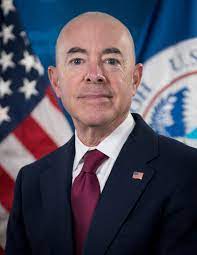Attorneys general coalition ask Ninth Circuit to intervene in Mayorkas asylum case

(The Center Square) – Attorneys general from multiple states have petitioned the Ninth Circuit Court of Appeals to intervene in a lawsuit over a Department of Homeland Security asylum policy.
DHS Secretary Alejandro Mayorkas created the policy through a federal rule, the “Circumvention of Lawful Pathways,” which codifies aspects of the Los Angeles Declaration of Migration and Protection, endorsed by 21 countries in June 2022. The declaration “specifically lays out the goal of collectively expanding access to regular pathways for migrants and refugees into the United States,” according to a February 2023 Federal Register entry.
The “lawful pathways” rule is one of over a dozen identified as illegal by House Republicans when they impeached Mayorkas last month. In one of the numerous lawsuits filed to stop them, 20 states sued and recently lost their first round in court. Among other things, the “lawful pathways” rule involves the U.S. State Department partnering with multiple countries to move foreign nationals into the U.S., DHS building and expanding dozens of processing facilities, and moving hundreds of thousands of people into the U.S. through a phone app.
Part of the rule reinstated a modified version of a Trump-era asylum ban, which prohibits foreign nationals who were living and working in countries or transited through countries other than Mexico from applying for asylum in the U.S. A credible threat of fear asylum claim couldn’t be warranted if applicants were living and working in another country before traveling through Mexico, according to the policy. Foreign nationals are also instructed to use the CBP One mobile app to file asylum applications and enter the U.S.
Multiple groups sued in response in East Bay Sanctuary Covenant et al v. Biden et al. They argue U.S. asylum laws don’t give the administration the authority to restrict how claims are filed using an app, how someone enters the U.S. or where they applied. Foreign nationals “cannot meaningfully seek asylum in transit countries because many lack a functioning asylum system,” the app is “flawed” and not everyone has a smart phone or access to the internet, they argue. The House is currently investigating the app.
Last July, U.S. District Judge Jon Tigar of the Court of the Northern District of California temporarily blocked the so-called asylum ban to allow the case to be appealed to the Ninth Circuit. The Ninth Circuit ruled last August it could remain in effect as the appeal was heard.
Throughout the case, the Biden administration argued that Mayorkas’ rule is lawful and the plaintiffs have no standing to challenge it. It also argued the rule “was absolutely necessary” and any interruption to it would lead to a border surge and “significantly disrupt and tax DHS operations.”
However, after the Ninth Circuit ruling, the administration reversed course, saying it would enter into settlement negotiations instead of defending the rule.
In response, Ninth Circuit Judge Lawrence VanDyke chastised the administration, saying, “The administration’s abrupt about-face makes no sense as a legal matter. Either it previously lied to this court by exaggerating the threat posed by vacating the rule, or it is now hiding the real reason it wants to hold this case in abeyance.”
Next, a coalition of attorneys general, led by Alabama and Kansas, filed a motion to intervene, also agreeing with Judge VanDyke. Their motion argues states “have no alternative means to protect their interests and to obtain relief.” They requested “to participate in settlement negotiations and to object, if necessary, to any proposed settlement, and to move this Court, if necessary, to lift the abeyance and resume its expedited consideration.”
They also argued the states “cannot rely on President Biden … to defend and enforce the Nation’s immigration laws. … Defendants have repeatedly failed to secure the border, appropriately screen those entering the country, and deport those who do not have a legal entitlement to remain here. And the States are left to deal with the resulting chaos.”
Next, a coalition of 17 states led by Florida filed an amicus brief in support of the intervenor states. Florida Attorney General Ashley Moody said, “This administration has repeatedly shown that it cannot be trusted, especially as it relates to defending the sovereignty of our nation and safety of our citizens. This president has turned every state in the country into a border state by allowing millions of unvetted and undocumented aliens into the interior. States have a right to be party to any settlement negotiations that will dictate border policy because we have an interest in protecting the safety of our citizens and the resources of our communities.”
Intervenor states include Alabama, Georgia, Louisiana, Kansas, and West Virginia. Moody’s coalition includes Arkansas, Indiana, Iowa, Kentucky, Mississippi, Missouri, Montana, Nebraska, New Hampshire, North Dakota, Ohio, South Carolina, South Dakota, Texas, Utah and Virginia.











